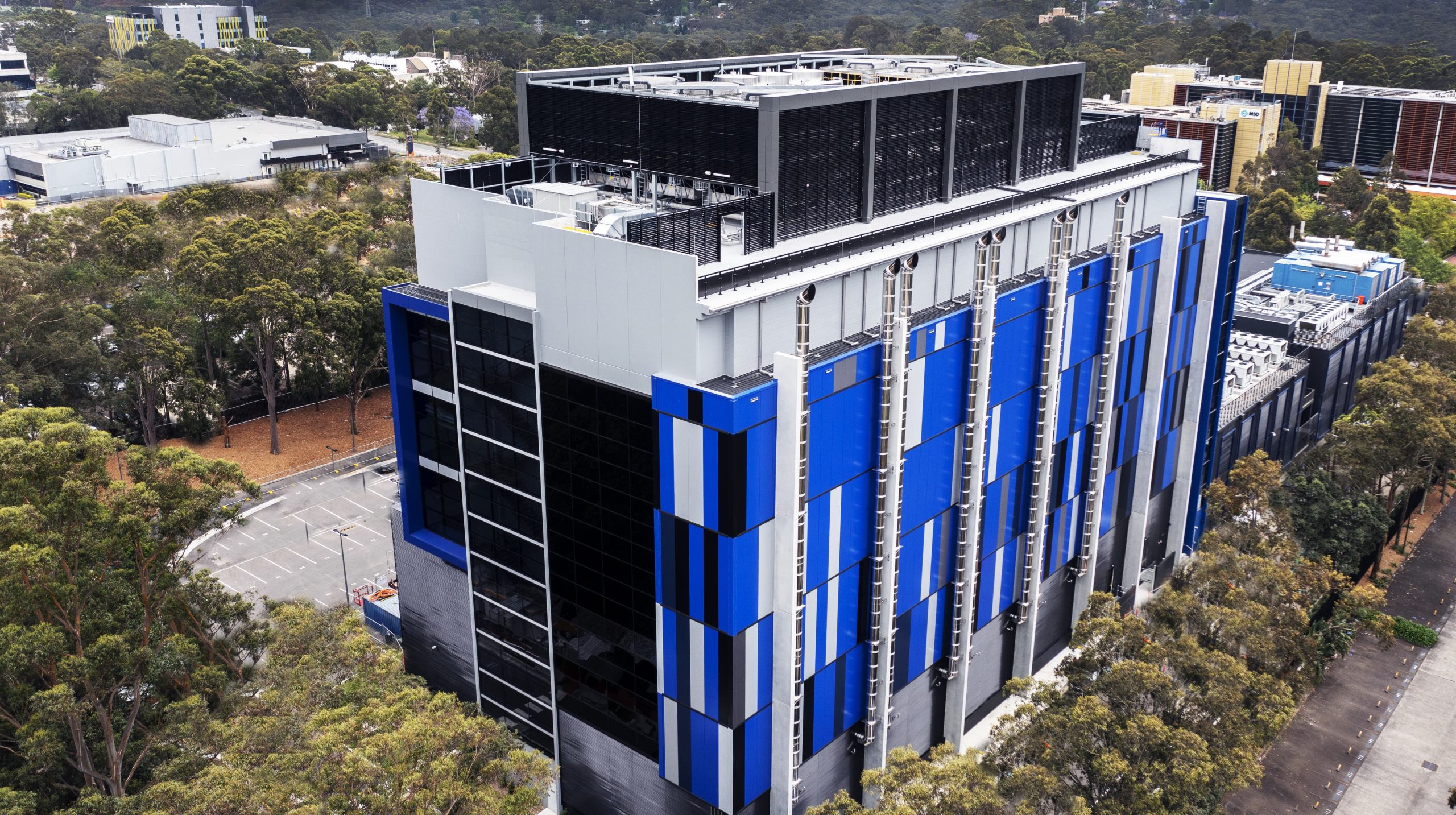Cyber Security Insights for Resilient Digital Defence
Cyber Security Insights for Resilient Digital Defence
Data Centre Security: Protecting Infrastructure from Physical and Cyber Threats
News
Logpoint appoints new Regional Director for CEMA
Logpoint has announced Sven Bagemihl as Regional Director for the CEMEA region, including Germany, Switzerland, and Austria. Sven will be responsible for building growth across enterprise customers and alliances within a fast-growing and highly competitive marketplace, working out of the new Logpoint offices in Munich.
Logpoint is the only major European provider of foundational SIEM, UEBA, SOAR, and SAP security technologies converged into a complete security operations platform. Logpoint secures digital transformation and helps organisations of all sizes combat cyber security threats, operate reliable IT infrastructures, and provide essential compliance with important regulations such as KRITIS, GDPR and NIS2.
“We are at a historical tipping point where global digital transformation is threatened by increasingly aggressive adversaries: organised crime and state-sponsored actors. The war in Ukraine, the energy crisis, and the COVID-19 pandemic have accelerated this development. I’m excited to join Logpoint at a time when the need for efficient and scalable European cyber security technology is more apparent than ever,” says Sven.
Scandinavian private equity fund Summa Capital recently announced the acquisition of a majority stake in Logpoint, investing in European cyber security resilience and building a European cyber security powerhouse as an alternative to the dominating US vendors. The Frankfurt-based investment firm Yttrium (formerly Digital+ Partners) remains a significant minority shareholder in Logpoint after the transaction.
“Logpoint has a decade-long track record of technology excellence and thought leadership in the cyber security domain. Across Europe, it’s increasingly becoming a priority for customers to work with vendors that have European DNA and understand the importance of privacy, data residency, and strategic resiliency. I believe Logpoint is in a unique position as the only native European SIEM/SOAR vendor,” says Frank Brandenburg, new Logpoint board member.
“With Sven and Frank, we are adding almost 60 years of technology and cyber security leadership experience to the Logpoint team. We are increasing Logpoint reach and capability, extending our ability to serve strategic partners and customers, and strengthening our position in the CEMEA market, particularly in Germany. They will be key assets on our way to creating the strongest European cyber security company with global reach,” says Logpoint CEO Jesper Zerlang.
Beatrice - 9 May 2023
Cyber Security Insights for Resilient Digital Defence
Data Centres
Hyperscale Data Centres: Scale, Speed & Strategy
Vultr expands global footprint with new data centre location
Vultr has announced the latest expansion of its global footprint in Tel Aviv, Israel, to provide democratised access to cloud infrastructure to the growing technology ecosystem in the country. With the addition of Tel Aviv and its new location in Manchester, England, Vultr is continuing its cadence of global expansion by moving closer to eclipsing the data centre availability offered by the big three hyperscale cloud providers.
The Tel Aviv data centre location puts Vultr on the map in Israel, where AWS and Azure have yet to establish availability zones. Vultr offers full-stack infrastructure in both Tel Aviv and Manchester, including cloud and GPU compute, Kubernetes clusters, managed databases, storage-as-a-service, and more. Establishing access to infrastructure-as-a-service (IaaS) in Israel is the latest advance in Vultr’s quest to provide full-stack infrastructure services in geographic regions underserved by the hyperscale cloud providers and democratise access to affordable cloud services for all organisations.
Vultr’s availability in Tel Aviv now means that organisations with operations in Israel can access cloud compute infrastructure and services domestically to work locally and collaborate globally while maintaining data compliance and minimising costly data transfer fees. The same applies to Vultr’s Manchester data centre location, which complements Vultr’s presence in London and fortifies Vultr’s already-solid position in the UK and beyond.
Headquartered in Tel Aviv, BBT.live uses Vultr for compute instances with its secured network connectivity solution, BeBroadband, enabling service providers to offer uncomplicated connectivity to their startup and enterprise customers around the world.
“Vultr's adaptable model and exceptional engagement allow us to set up our Points of Presence (PoPs) on demand and deliver our services within a matter of hours rather than weeks to expand our business to new geographies rapidly,” says Erez Zelikovitz, EVP, Chief Revenue Officer and Chief Product Officer at BBT.live. “We are delighted that Vultr is available at a Tel Aviv data centre, close to our headquarters, which complements our already extensive list of locations across North America, Europe, and Asia where BeBroadband-Cloud PoPs are hosted.”
“By bringing affordable, enterprise-grade cloud services to organisations around the world, Vultr is levelling the playing field for businesses striving to introduce breakthrough innovation in startup nations like Israel,” says J.J. Kardwell, CEO of Vultr’s parent company, Constant. “Vultr is breaking the big three hyperscalers’ stranglehold on customers in need of cloud infrastructure, who must endure the lock-in and exorbitant pricing associated with these inflexible cloud behemoths in exchange for IaaS access that isn’t customised to each organisation’s unique profile of needs.”
Technology, digital, and cyber security startups, alongside established enterprises in the country, now need high-performance cloud resources. Vultr is stepping into the market to provide access to flexible cloud resources - spanning from bare metal options to GPU compute available on demand. Vultr ensures that access to these valuable resources isn’t limited to just the tech giants. Businesses looking to power generative AI solutions like ChatGPT or run other compute-intensive applications can now leverage the flexibility and cost-saving advantages Vultr brings to an ever-growing number of data centre locations.
Vultr will host two events in Tel Aviv for the launch of its availability in Israel. A media breakfast briefing at The Norman Hotel on 16 May, from 9:30-10:30 am IST, and The industry event, Cloud as You Are, at Pop & Pope on 16 May, from 6:00- 8:00 pm IST.
Beatrice - 3 May 2023
Cyber Security Insights for Resilient Digital Defence
Data Centre Security: Protecting Infrastructure from Physical and Cyber Threats
Collaboration delivers API security to cloud architectures
Noname Security has announced that it has been accepted by Accelerated by Intel.
Noname Security software takes advantage of 4th Gen Intel Xeon Scalable processors and Intel's NetSec Accelerator Reference Design, incorporating an Intel Ethernet E810 network interface with an embedded system on a chip (SoC) to accelerate API response times for low latency use cases and the performance of near-real-time machine learning for runtime API security at the edge of the network.
Noname Security's platform was optimised using 4th Gen Intel Xeon Scalable processors and Intel Advanced Matrix Extensions (AMX), a new built-in accelerator that improves deep-learning training and inference performance on the central processing unit (CPU).
Noname Security's Sensor with Intel NetSec Accelerator Reference Design will allow customers to offload network and security tasks processing to the accelerator, preserving server resources for more generic operations. This integration opens up a broad spectrum of new industry vertical solutions utilising edge processing, including addressing extremely low latency requirements.
“Noname Security is committed to helping organisations secure all their APIs, and partnering with Intel is a significant step in achieving that goal," says Oz Golan, CEO of Noname Security. “Intel's technology expertise will enable us to provide the best-of-breed API security solution for more customers and help them secure their critical assets against advanced cyber threats.”
Key benefits for Noname Security and Intel customers include:
• Improved performance using the same or lower power, up to three times for specific scenarios
• Up to 10 times faster machine learning (ML) inferencing, benefiting runtime API security capabilities
• Deployment options for hybrid, private, and public cloud architectures as well as on and off-premises
• API Security for extremely low latency use cases, including telecommunications and edge computing
• Seamless offloading of API processing, and adjacent networking and security functions, on the accelerator card
• Increased performance and response times, leading to better utilisation of resources and decreased total cost of ownership for customers
• New use cases, including 5G, satellite communications, military, and intelligence community applications
Beatrice - 27 April 2023
Cyber Security Insights for Resilient Digital Defence
Data Centre Operations: Optimising Infrastructure for Performance and Reliability
News in Cloud Computing & Data Storage
Scalable Network Attached Solutions for Modern Infrastructure
Immutable storage is the one solution that will keep your data safe
By Florian Malecki, Executive Vice President of Marketing at Arcserve
As businesses increasingly rely on the cloud to manage their data, they face more pressing concerns regarding data security and integrity. These concerns become even more complex in multi cloud and hybrid-cloud environments, where companies distribute data across multiple platforms. But there is a solution: immutable data storage. Immutable storage preserves data in its original state, thus preventing tampering.
Immutable data storage ensures data security and integrity in multi cloud and hybrid-cloud environments in several ways. First, immutable storage guarantees that the data remains tamper-proof and unaltered.
Second, immutable storage provides a transparent record of all data transactions. Each change to stored data is recorded and stored as a separate immutable object. It means that, in the event of an attack, it is much easier to trace the origins of the breach and identify which data has been affected.
Finally, immutable storage provides an added layer of protection against accidental data loss or data corruption. Because data creators cannot alter the data once they have created it, it becomes much harder to overwrite important data.
Implement immutable storage across platforms
Some challenges come with implementing immutable data storage in multi-cloud and hybrid-cloud environments. One of the biggest is the complexity of managing the solution across multiple platforms. Each cloud platform may have its storage protocols, which makes it challenging to maintain a consistent immutable data storage strategy spanning all platforms.
Your strategy might work well for one cloud, but another might not accommodate immutability. As your data travels to multiple destinations, the question is: are you getting the benefits of immutable storage everywhere your data ends up?
Shadow IT within your company compounds this challenge. Your organisation might have multiple groups, from marketing to engineering to product management, all using different SaaS applications without the IT department even knowing. In that case, you don’t know if the data is being backed up or, ultimately, where it’s going. Is it going to a place with an immutable storage solution? You don’t know. That’s why shadow IT is an area of serious concern. It’s crucial to ensure that data stored in all shadow IT applications is on an immutable storage solution to maintain data integrity.
To address these challenges, you should implement a unified data storage strategy that spans all cloud platforms. This strategy should involve standardising on a single immutable data storage protocol or investing in tools and technologies that can help manage data across multiple platforms.
Solve compliance concerns with immutable storage
Immutable data storage can also address challenges posed by data privacy and compliance requirements. Many industries, such as healthcare and finance, now mandate data preservation by law. Any business subject to such requirements must have mechanisms to prove that it maintains healthy copies of its data that cannot be altered or modified. Here, immutable data storage is often the answer because it helps ensure compliance with strict data retention and audit requirements.
Immutable storage enables organisations to store data in a tamper-proof manner, which makes it easier for them to demonstrate compliance during audits. Immutable storage prevents alteration and provides an audit trail that lists the history of all data changes, demonstrating transparency and accountability. It is essential because regulators and auditors must verify that organisations follow specific rules and compliance requirements.
Organisations with immutable storage as a resource for audit trails can show the outside world, including customers, partners, and investors, that they are compliant. It increases trust and confidence in the organisation and its capacity to handle sensitive data.
Enforce strict access controls
While a multi cloud approach to immutability is beneficial in many ways, it still can be vulnerable regarding privileges and administrator rights to data. Even though an immutable solution is very secure, a bad actor who gains access - whether a malicious employee or a third party with privileged account-management access - can delete data. It presents a real risk since data alteration or deletion can cause irreparable damage to an organisation’s operations.
In other words, the danger of unauthorised access remains even if your data is stored on an immutable solution. If someone has privileged access to the data, they can delete it, regardless of the security measures in place. For this reason, it’s essential to couple immutable storage with strict access controls and monitoring mechanisms to prevent unauthorised access and ensure data integrity.
Think about the keys to your home. If the bad guys get hold of them and gain access, they can take anything they want. Similarly, if someone gains privileged access to your data, they can delete it, causing significant harm to your organisation. Therefore, it’s critical to implement strict access controls and monitoring mechanisms.
Recognise that immutability is now a necessity
Immutable storage is no longer a fantasy; it’s reality. It’s no longer a luxury; it’s a 100% must-have. With the rise of multi-cloud providers - and the explosion of cyber threats - it’s now crucial to ensure that all providers have immutability. When it is, organisations can limit the risk of a breach and ensure their long-term survival. Cyber thieves are roaming the avenues of the digital world, rattling doors and looking for a way in. Immutable storage is the lock that will keep your data safe.
Beatrice - 21 April 2023
Cyber Security Insights for Resilient Digital Defence
News
Macquarie changes its name to Macquarie Technology Group
Macquarie Telecom Group has announced that it intends to change its listed company name to Macquarie Technology Group, reflecting the company’s evolution to become a digital infrastructure business through its success in cloud infrastructure, cyber security, data centres, and telecom.
Recognising that the successful execution of its strategy has fundamentally changed the company over the last decade to a core plus digital infrastructure business, Macquarie will be applying to move from the S&P index ‘Diversified Telecom Services’ to ‘Internet Services and Infrastructure’.
Macquarie’s strategy has delivered seven consecutive years of EBITDA profit growth and its share price has increased by over 500% during this period with its market capitalisation now exceeding $1 billion.
“We are still Macquarie, a proudly Australian company, driven by our purpose to make a difference in markets that are underserved and overcharged. Macquarie‘s world class NPS score of +79 is a testament to the customer experience we deliver for businesses and government agencies,” says Chief Executive David Tudehope.
“As our customers turn to cloud-based solutions, they value our single accountability for cyber security, cloud performance and secure world scale data centres,” David continues. “Our four businesses’ names are unchanged as they reflect what they do - Macquarie Cloud Services, Macquarie Government, Macquarie Data Centres and, where our story proudly started, Macquarie Telecom.”
Beatrice - 18 April 2023
Cyber Security Insights for Resilient Digital Defence
Data
Data Centres
News
Scalable Network Attached Solutions for Modern Infrastructure
Infinidat named on the 2023 CRN Storage 100 List
Infinidat has announced that CRN has named it in its annual Storage 100 list in the software-defined storage category. The Storage 100 recognises industry-leading storage vendors that provide transformative, channel-friendly solutions and services.
Infinidat was selected for the 2023 Storage 100 list because of its powerful commitment to pushing the boundaries of innovation through cyber resilient, software-defined storage enterprise solutions, while building strategic relationships with IT solution providers in the channel. Infinidat supports its channel partners with one of the most robust partner programs in the industry, earning a five-star rating from CRN last month for the second year in a row.
“Infinidat has set a new standard for enterprise storage, delivering an outstanding portfolio of award-winning storage solutions for enterprises and service providers seeking the best in primary storage, modern data protection, disaster recovery, business continuity, and cyber storage resilience,” says Eric Herzog, CMO at Infinidat. “We’re very honoured to be named on the 2023 CRN Storage 100 list. It affirms our continued momentum working with our channel partners to shape the future of enterprise storage.”
Supporting growth, Infinidat recently rolled out a series of new initiatives, extensions, and updates to its channel partner program worldwide. Among the most popular additions is the introduction of its major new sales enablement and training program - the Infuziast Certified Partner Program. Channel partners, ranging from sales consultants to technical personnel, will be able to earn certification and rewards through this new program. Infinidat is also establishing partner advisory boards for the channel this year.
Go-to resource for IT solution providers
The Storage 100 list is a valuable resource for solution providers looking for vendors, including Infinidat, that can support them in a complex storage market with portfolios in areas such as data protection, management and resilience, software-defined storage, and storage components. This year’s list represents the industry leaders of storage technology that can be used for on-premises or cloud deployments. Infinidat is a leader in cyber resilient storage for hybrid cloud implementations. Infinidat is the winner of more than 30 storage industry awards and recognitions since January 2022.
“CRN’s 2023 Storage 100 list recognises the leading vendors that are delivering transformative advancements in storage technology and bringing modern solutions to customers and solution providers that are built for the future,” says Blaine Raddon, CEO of The Channel Company. “We are honoured to recognise their contributions as the leading players in storage technology for 2023.”
Beatrice - 11 April 2023
Cyber Security Insights for Resilient Digital Defence
Data Centre Security: Protecting Infrastructure from Physical and Cyber Threats
Industry leader continues to define the API security market
Noname Security has announced enhancements to its API security platform to help organisations protect their API ecosystem, secure their applications, and increase cyber resilience.
Noname enables secure growth with API security innovation
Today, APIs drive businesses, delivering value to customers, clients, patients, users, shareholders, and more. However, securing APIs - and all of the critical assets they connect - has become more difficult than ever as APIs attacks have increased exponentially. IBM Security X-Force reported that two-thirds of its analysed incidents were due to unsecure APIs.
“APIs are the connective tissue for the digital world, but the explosion in API use has created new and rapidly growing threats to organisations across the globe. We created the Noname API Security Platform to uniquely address the modern API ecosystem, with discovery, insight, protection, and testing capabilities,” says Shay Levi, co-founder and CTO at Noname Security. “Doing so means not only securing APIs and their use, but also improving the speed at which our customers can expand their businesses.”
Discover more and strengthen security posture
Noname Security’s discovery and posture management solutions locate and provide insight to every API in an organisation’s ecosystem, uncovering vulnerabilities (including the most recent OWASP API Top Ten), protecting sensitive data, and proactively monitoring for changes, including in OpenAPI and other specifications. New capabilities enable customers to:
• Gain complete visibility and detailed insights to protect APIs with customisable discovery, flexible tagging, and datatype assignments - including PII, PCI, PHI, and custom categories - for grouping APIs by application, business unit, and more.
• Understand APIs in rich context with visualisations of business logic, physical network infrastructure, and API traffic to understand specific interactions and behaviour patterns.
• Secure containerised applications with enhanced discovery and detection for Kubernetes (k8s).
• Prioritise resources and eliminate blind spots with extensive infrastructure inventories for AWS and Azure, enabling organisations to find unprotected APIs, map the connections between APIs and infrastructure resources, pinpoint resources that could increase the attack surface, and resolve potential issues with full context.
Stop attacks with runtime protection
Noname Security Runtime Protection detects and blocks API attacks with real-time traffic analysis, out-of-band monitoring, inline remediation options, and workflow integrations to increase SOC effectiveness. New capabilities enable customers to:
• Identify business-logic-based attacks immediately with updates to the industry’s most advanced anomaly detection engine using artificial intelligence and machine learning (AI/ML), including unsupervised online learning.
• Reduce Mean-Time-To-Resolution (MTTR) with more context on issue records, including detailed remediation guidance and tools for deeper investigation.
• Fully align with security operations centre (SOC) processes with automation, custom workflows, and integrations with existing systems such as ITSM, SIEM, SOAR, and more.
Deliver secure APIs faster with active testing
Noname Security Active Testing is a purpose-built API security testing solution that helps organisations add security into the CI/CD pipeline without sacrificing speed. The newest version of active testing enables customers to:
• Shift left with integrations into the entire software development lifecycle (SDLC). Teams get dynamic API visibility across multiple states and environments throughout the CI/CD process.
• Leave no API untested with a unique ability to find and test every API based on an understanding of the application’s business logic.
• Empower developers with best-in-class usability such as simple set up and automation, in-line test results, and contextual guidance for request failure mitigation.
Continuously adapt to changing environments
Noname Security offers the most flexible and comprehensive set of deployment and integration options available. New capabilities enable customers to:
• Rapidly realise value with simplified step-by-step onboarding and in-app guidance.
• Meet any deployment requirement with both agentless and agent-based options, including eBPF, and both out-of-band and inline protection options.
• Easily manage complex deployments with automatic updates across cloud-hosted, self-hosted, hybrid, and distributed deployments.
• Maintain data residency and reduce overhead with remote engines to aggregate traffic into a centralised console, allowing you to keep data within your control and reducing traffic.
• Meet strict public-sector compliance requirements with a new hardened virtual appliance.
• See the entire attack surface with additional integrations and improvements to Akamai, AWS ECS, Cloudflare, Oracle Cloud Infrastructure, Citrix, and other connectors.
Beatrice - 4 April 2023
Cyber Security Insights for Resilient Digital Defence
Events
News
Matt Dawson to help build team cultures at DTX + UCX Manchester
Manchester will play host to the north’s biggest digital and IT transformation event in May - with World Cup-winning rugby star, Matt Dawson, the former Director General of MI5, Dame Stella Rimington, and Greater Manchester Mayor, Andy Burnham, headlining as the city gears up for Tech Week 2023.
Digital Transformation EXPO (DTX) has been a firm fixture in the region for seven years, running previously as IP EXPO. The 2023 event will see the greatest gathering of enterprise IT and digital professionals yet - with thousands flocking to Manchester Central on 17-18 May for keynote speeches, regional case studies, interactive panels, technical workshops and community socials.
In light of enterprise IT teams feeling mounting pressure to balance accelerated innovation with cost optimisation, the event will focus on the cornerstone theme: ‘Together We Transform’.
Uniquely placed to encourage collaboration, the combined showcase DTX + UCX Manchester 2023 will connect leaders in cloud, networks, data, devops, cyber security and the modern workplace to tackle the coming challenges together.
Attendees will discuss and debate how to optimise tech stacks, unravel legacy data systems, design a next-generation engineering strategy, operate feature-rich modern workplace toolsets, build threat-responsive ecosystems, and meet changing customer demands.
Matt Dawson - who is fast approaching the 20-year anniversary of his World Cup victory - will reflect on a long and varied career in a keynote interview on ‘Finding your edge: how to overcome weakness, trust your intuition and lead a team through hard times’. He will offer insights on how to build a world-class team culture, the lasting value of critique to guide tactics and what it takes to be your best, on and off the field.
Dame Stella Rimington - the first woman to become Director General of MI5, and dubbed the real-life M from James Bond - will share how to lead in times of challenge and change. Revealing how she has navigated a life of unexpected opportunities, Dame Stella will discuss why human insight is still critical to success when assessing information, even as artificial intelligence advances at rapid speed.
Greater Manchester Mayor, Andy Burnham, returns to close the show on day one with a first-look at the digital vision laid out in the Greater Manchester Digital Blueprint for 2023-2026.
Other big hitters on the line-up include John Hobson, Chief Information Officer at Kellogg Company; Ben Morris, Global Director of Cyber Security at The Hut Group; Mivy James, Digital Transformation Director at BAE Systems Digital Intelligence; Adam Lindsay, Director of Business Operations at Groupon; Leanne Fitzpatrick, Director of Data Science at The Financial Times; Rob Black, Technology Director at Beauty Bay; and Risk Alkunshalie, Head of Technology at Manchester Airports Group.
The brands behind cutting-edge enterprise IT technology will also be ready to showcase the tools needed to power a digital future. Taking centre stage are Dell, AWS, Okta, Ring Central, Blue Jeans, Threatlocker, Slalom Build, Sophos, Intel, Sentinel One and Gamma, along with many other exhibitors.
Head of Research and Portfolio Development for DTX, Natasha Taylor, states, “Manchester is a world-leading hub of technology and innovation, which makes it the perfect place to host the biggest digital transformation and IT event the north has ever seen.
“This year is going to be the best yet - featuring a phenomenal line-up of guest speakers, a huge variety of exhibitors and some surprises on the show floor.
“We’re proud to bring together teams from all realms of the enterprise IT space, across every industry, to share ideas, tackle the latest challenges and troubleshoot tricky problems. Every year we witness the real-time collaboration needed to drive the delivery of ambitious transformation plans.
“DTX + UCX Manchester is the place where great minds discuss ground-breaking ideas, and we can’t wait to hear what the big topics of conversation are this year.”
Beatrice - 3 April 2023
Cyber Security Insights for Resilient Digital Defence
Data Centre Security: Protecting Infrastructure from Physical and Cyber Threats
The data centre operators investing in DDoS mitigation
By Adrian Taylor, VP EMEA at A10 Networks
For commercial data centre operators, business is good. Inventory and workloads are growing, while the percentage of vacant capacity is shrinking - indicators of success that have led to a projected industry revenue of nearly £50 billion by 2025. Although the future of the industry is looking bright, there are some threats on the horizon. The cost of downtime continues to grow. The Uptime Institute found one in four data centre incidents of downtime exceed $1 million. As DDoS attack methods become more sophisticated, effective and frequent, data centre operators need to bank on mitigation.
A recent survey by A10 Networks and Gatepoint Research found that senior decision makers at commercial data centres are under siege from cyber criminals. Data centre and colocation providers are concerned not only about the cost of intensifying DDoS attacks, but also about lost business and reputational damage. Dissatisfied with their current data centre security and DDoS defence capabilities, many are seeking better ways to address the threat - and an increasing number want to extend that protection-as-a-service to their tenants as well.
The simple yet devastating DDoS threats
As disclosed in the latest A10 Networks DDoS Threat Report, DDoS threats are soaring. The number of tracked DDoS weapons in the environment has nearly tripled in the past two years, and the 3.45 Tbps DDoS attack on Microsoft Azure in late 2021 showed the unprecedented scale hackers are now capable of achieving. Of course, size isn’t everything - even attacks under 500Mbps that slip through data centre security gaps can have a significant impact on service. In fact, these smaller exploits are proliferating fast, as botnets-for-hire make it easy for even unskilled hackers to wreak havoc. A single compromised server can open the door to a flood of malicious traffic in under half a minute.
Commercial data centre operators are all too aware of the situation, reporting to A10 Networks that DDoS threats in their networks are growing more sophisticated (64%), more frequent (48%), and larger (38%). Even a single DDoS attack can have a serious impact, impairing or denying mission-critical services for an individual data centre tenant or across the entire facility - and nearly one in 10 survey respondents are suffering such incidents weekly, or more. Lost business and customer attrition from a DDoS attack is a concern for nearly two-thirds of providers, and rightly so.
Staying ahead of evolving tactics
While data centre security and DDoS defence capabilities such as fast detection and response can limit the damage from a DDoS attack, time is of the essence. Data centre and colocation providers need to be able to distinguish a sudden flood of fraudulent requests from legitimate usage in real time, at massive scale, to filter out malicious traffic without disrupting their customers’ normal business operations.
DDoS mitigation solutions typically offer features and capabilities such as benchmarking, anomaly detection, IP reputation lists, connection and rate limits, and attack mitigation, but these essential DDoS defence tasks need to be performed thoroughly and frequently. The A10 Networks-Gatepoint survey reported that data centre operators missed attacks, saw slowed performance, decreased service availability, and in an alarming number of cases, an inability to adequately detect DDoS threats at all. Nearly two in five are planning to re-evaluate their DDoS defence solution in the near future.
Tenant shielding services
Value-added services are a core element of the commercial data centre business, with a large majority of survey respondents going beyond space, power, and cooling to offer managed network services, professional IT consulting services, and remote management and troubleshooting. Given the tenant mix of the typical commercial data centre, often dominated by financial services, retail, and government customers, data centre security services are also a very popular offering.
DDoS mitigation is particularly well suited to this model. From the tenant’s perspective, a DDoS mitigation service makes it possible for even small businesses to tap into high-end features such as machine learning, automation, and rapid mitigation. For the data centre provider, protection for individual tenants can reduce the risk of an out-of-control attack causing ancillary damage to neighbouring tenants or the data centre itself.
When offered free of charge, DDoS mitigation can be a powerful competitive differentiator and customer enticement. Offered on a paid basis, potentially in multi-tiered models, DDoS mitigation services can open a rich new revenue stream. However, many in the industry have been slow to respond to either the advantages or the necessity of tenant DDoS mitigation, with only 58% offering such services either free or for an added fee. As DDoS threats increase, investing in effective mitigation services is a vital step for data centre operators, in order to protect tenants, themselves, and to fulfil the bright projections for the industry.
Beatrice - 24 March 2023
Cyber Security Insights for Resilient Digital Defence
Data
virtualDCS signs agreement with Seagate
virtualDCS is continuing to improve the speed at which its partners can restore, move, and consolidate data after forming a unique partnership with Seagate.
The new Seagate Lyve offering, known as CloudCover Shuttle at virtual DCS, offers a fast and secure method of physical data transfer to avoid long transfer times that are dependent on internet bandwidth. The shuttle enables businesses to move their data quickly, securely, and simply from endpoints to the edge and to the landing destination of the data - be it private, public, or hybrid clouds.
Organisations that are seeding backup data, recovering data after a disaster, or carrying out hardware upgrades and cloud migrations, can now access a physical data ‘shuttle’ service, without the need for capital expenditure and hardware purchases.
The shuttle offers a range of storage capacities and is delivered promptly, as well as being securely encrypted and tracked while it is being transported. Once the shuttle is returned, it will then undergo a full crypto-erase.
The new offering is an extension of the virtualDCS CloudCover suite of services, which enables virtualDCS partners and their customers to backup and replicate business-critical data on their terms.
Kurt Kiefer, Chief Revenue Officer at virtualDCS, says, “Our CloudCover suite is extremely popular, offering a comprehensive range of data protection services from full backups to near real-time failover of systems, as well as protecting against ransomware and other cyber threats.
“Although data protected by the CloudCover suite can be recovered almost immediately, the ability for an organisation to fully restore and move data back to its own systems after a DR event often brings additional challenges. A stage that’s frequently underestimated by many is the reabsorption of the data back to its original location, or even to a cloud platform.
”Even though a few terabytes can be restored relatively quickly, for larger datasets it can take days, weeks, or even months and will completely saturate networks and internet bandwidth. CloudCover Shuttle addresses this challenge of repatriating data back to its origin in a timely, controlled, and secure manner.
“Joining forces with Seagate Lyve solutions, CloudCover Shuttle offers organisations a level of security and encryption that exceeds anything else in the market including user-based permissions, tracking and crypto-erase.
“This is particularly compelling for organisations operating in industries that have high levels of compliance and that can’t risk their data falling into the wrong hands, as well as anyone who understands the value and concept of time to data.
“Crucially, we’ve also created a simple pricing model, where customers pay for the time they need the shuttle, rather than having to buy their own physical device, which would require a substantial investment and take up more valuable time.”
Steve Jones, Lyve Business Development Manager at Seagate, says, “virtualDCS is always exploring how it can maximise data innovation. It has identified that many organisations faced a problem around data logistics and time to data after recovering from a disaster, which until now has been a big industry challenge.
“Our new collaboration addresses this problem by providing one of the fastest, most reliable and secure data storage and transfer services giving a clear competitive advantage not only to virtualDCS, but also to its partners and customers.”
Beatrice - 20 March 2023

Head office & Accounts:
Suite 14, 6-8 Revenge Road, Lordswood
Kent ME5 8UD
T: +44 (0)1634 673163
F: +44 (0)1634 673173









